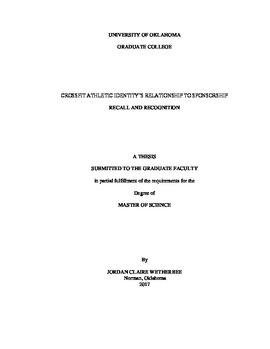| dc.description.abstract | Introduction: The CrossFit Open is possibly one of the most inclusive participation sport events ever, as it allows CrossFit athletes from across the world to compete against each other to test their fitness abilities. The Open consists of 5 weeks with 5 different workouts, existing both in the physical space where the workouts are completed and online where the uploaded scores are posted to the leaderboard. Participant sport events that rely heavily on sponsorship to successfully operate have been the subject of some previous research, but no apparent studies have examined event sport event sponsorship effectiveness in a case such as the CrossFit Open where sponsor messages are primarily, and almost exclusively, delivered through online website content.
The Athletic Identity Measurement Scale (AIMS) was created to measure an individual’s identification with an athlete role (Brewer). An early study measuring AIMS (modified for running athletes) and participants’ ability to recall and recognize event sponsors, suggested that the total identity score of the participant positively influences their ability to recall and recognize sponsors, as well as their purchase intentions (Lough). As the identity of an athlete can increase as involvement in sport grows, it is important for sponsors and event organizers to consider the differential impact of athletic identity on the effectiveness of sponsor messaging.
Purpose. The purpose of this study was to examine the relationship between an individual’s level of Athletic Identity and their ability to recall and recognize official sponsors of a participant event presented in an online environment.
Methods. A cross-sectional research design was used, with a qualitative treatment validation. A questionnaire respondent sample (N = 170), was collected via convenience sampling of local CrossFit Open participants from 36 CrossFit affiliates in Oklahoma and North Texas. Additionally, a subset of four subjects participated in laboratory eye-tracking to qualitatively assess the attention and viewing patterns associated with their typical interaction.
The survey consisted of 24 questions measuring the participant’s involvement in CrossFit and the CrossFit Open, their website interaction (number of visits and time spent), CrossFit Athletic Identity (CAI), unaided sponsor recall, sponsor recognition, purchase intention of the CrossFit Open sponsors, CrossFit Open sponsor previous familiarity, and demographics (gender and age).
Results and Conclusion: CAI was not a statistically significant predictor for sponsor recognition or recall, but when participants were divided into tertile CAI levels (low, mid, high), there was a statistically significant difference between the low and high levels when measuring purchase intention of the CrossFit sponsors. Count of previously familiar brands was the only significant predictor for predicting recall of sponsors, while age and count of previously familiar brands were significant predictors in predicting recognition of sponsors. After strictly controlling for prior brand familiarity, i.e. considering only previously unfamiliar brands, the number of website visits had a negative impact on number of brands correctly recognized and gender was a significant predictor in sponsor recognition. CAI was not associated with sponsor recognition and recall variation in this sample, but based on the qualitative assessment of the case study’s website interactions it is believed that participants in this study may not have been exposed to enough sponsor signage in the online environment to create the memory processes needed to later recall and recognize sponsors. | en_US |
